Thanks to John Paul for the following:
If maths were taught the way religion is taught in many Catholic schools:
How do you feel about numbers?
Meditate on your favourite number, then write a paragraph about why it is your favourite.
Choose a song and identify some of the ways in which numbers are present in it. Play the song for the class and lead a discussion about what the class thinks the song expresses about numbers.
Which number is most present to you in your life today? Which number is most absent?
We're going to watch a movie. At the end of the movie we'll discuss the ways in which numbers are explicitly and symbolically portrayed in it.
What can you do to be more aware of numbers in your everyday life?
What are your best and worst experiences involving numbers?
Make a poster in which you creatively and colourfully depict a number of your choice.
Although some numbers are called "greater" and others are called "lesser", in what ways are all numbers really the same? In what ways can the "lesser" numbers be considered greater than the "greater" numbers, and in what ways can the "greater" numbers be considered less than the "lesser" numbers?
Even though irrational numbers cannot be expressed as the quotient of two integers the way rational numbers can, explain how irrational numbers should be respected and considered to be no different from rational numbers.
Explain how the traditional classification of integers as either odd or even is merely a social construct.
Explain how every number has something good about it.
Do you accept the way that previous generations have used numbers? How do you think numbers should be used? Is there a right or a wrong way to use numbers? What do you consider to be the most personally meaningful way to use numbers?
How has the way you use numbers changed throughout your life? How do you think you will use numbers in the future?
Explain why a diversity of numbers is good and what you can do to promote number diversity.
Explain how multi-cultural approaches to numeral systems (e.g., Mesopotamian, Roman, Arabic) can enrich our appreciation of numbers. Also explain why no numeral system is better than any other system.
You will have to do a group project in which each person contributes a number. Present to the class all the ways your group can relate the numbers to each other. Your presentation can be a PowerPoint or a video in which you creatively animate the numbers your group selects.
Write an essay in which you pretend that you are a number. Explain what you think it would be like to be that number.
If you believe in your heart or in your conscience that 2+2=5, does anyone else have the right to tell you that you're wrong? Explain why we should avoid judging other people's mathematical operations.
Fractions are divisive. Can you think of better ways to express a quotient, without using divisive fractions? Is division something we should strive to do with numbers anyway?
Explain why the labelling of numbers as either "positive" or "negative" is discriminatory, hurtful, and a manifestation of the bigotry of value-ism. How would you feel if you were labelled a "negative" number? What can you do to help end this kind of discrimination?
Create a collage of numbers

 Congratulations especially to the Friars of the Renewal, ordained at St Patrick's Cathedral New York on Saturday. A photo sequence of the Ordination can be found here. Congratulations especially to Fr Augustine Conor, pictured here giving his first blessing to Cardinal Egan, and to Fr Emmanuel making his promise of fidelity.
Congratulations especially to the Friars of the Renewal, ordained at St Patrick's Cathedral New York on Saturday. A photo sequence of the Ordination can be found here. Congratulations especially to Fr Augustine Conor, pictured here giving his first blessing to Cardinal Egan, and to Fr Emmanuel making his promise of fidelity.

















































